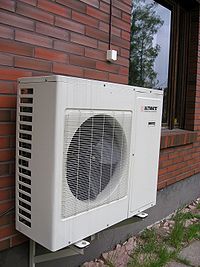
Photo from wikipedia
Abstract The rising share of renewable energy sources in power generation leads to the need of energy storage capacities. In this context, also some interest in thermal energy storages, especially… Click to show full abstract
Abstract The rising share of renewable energy sources in power generation leads to the need of energy storage capacities. In this context, also some interest in thermal energy storages, especially in a concept called pumped heat electricity storage (PHES), arises. One possible design of such a PHES system consists of a compression heat pump (HP), a thermal storage and an organic Rankine cycle (ORC). The present work analyses the general thermodynamic potential and limits of such a system by means of realistic simple Rankine cycles. The potential analysis starts with the optimal case of combining two reversible Rankine cycles with reversible heat transfer. Afterwards Rankine cycles are transferred to more realistic cycles by taking temperature differences between heat sink and source and the cycles, respectively into account (irreversible heat transfer). For this case the relation between power output of the discharging cycle and the efficiency of the entire process is analysed. In order to ensure optimal conditions, the considered working fluids are always optimal hypothetical fluids, which are defined by their critical point and some further parameters. In an inverse engineering approach, these parameters are numerically optimized, with respect to cycle efficiency and meeting several boundary conditions. It is shown that the total or roundtrip efficiencies, which are defined by the quotient of the rejected work and the stored work, are between 56% and 37% for a power output of 80% of the maximal value and decrease with increasing storage temperatures, in contrast to a Carnot cycle analysis. A further expansion of the investigation considers the influence of the isentropic efficiencies of the ORC expander and the HP compressor on the process efficiency. Here, a stronger sensitivity of the isentropic efficiency of the ORC expander on the roundtrip efficiency was found.
Journal Title: Renewable Energy
Year Published: 2020
Link to full text (if available)
Share on Social Media: Sign Up to like & get
recommendations!